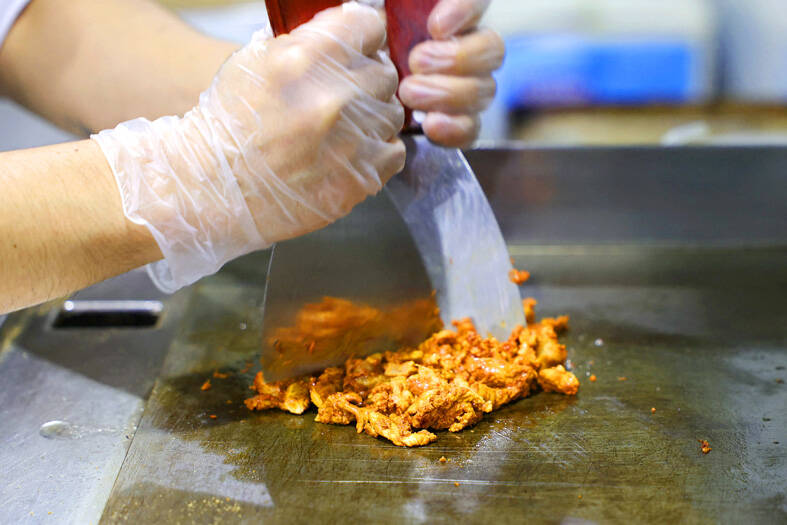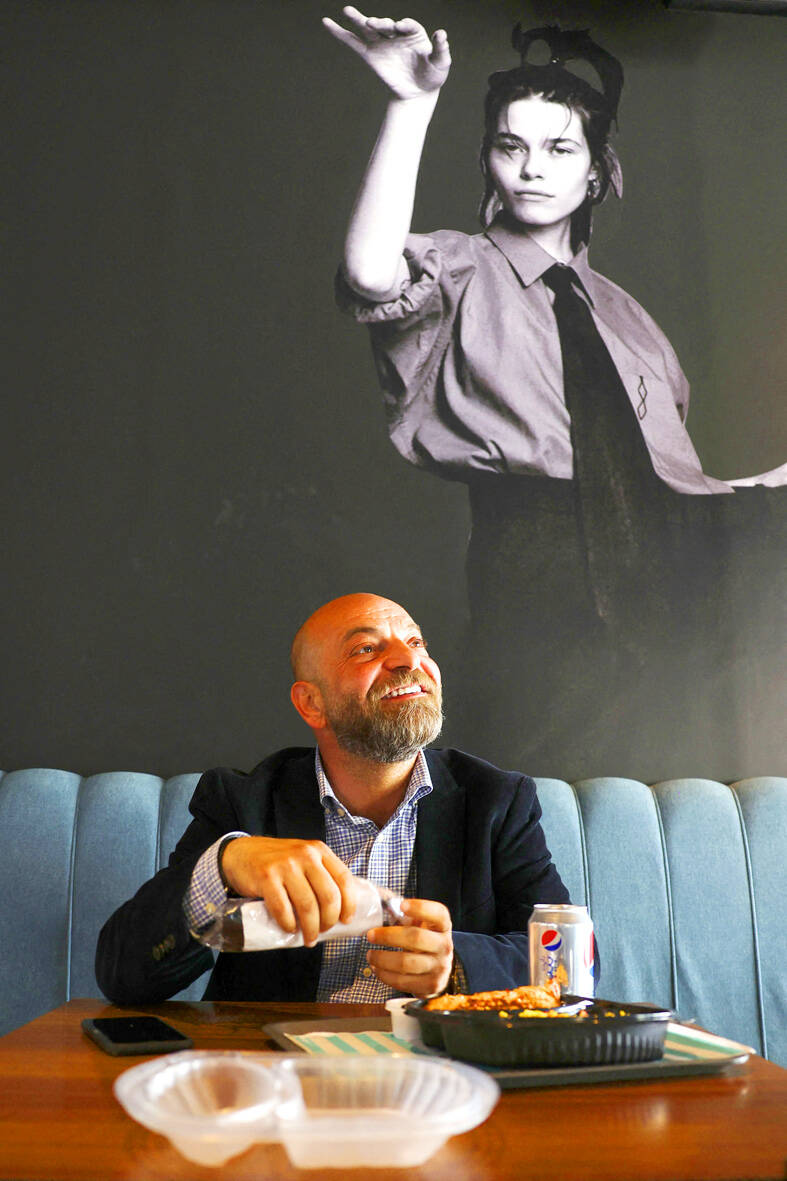Long partial to heavy lunch platters of meat and rice, Asim al-Shammari has recently turned to lighter fare from a self-described diet restaurant, swayed by Saudi Arabia’s push against obesity.
About one in five Saudi Arabian adults is obese, according to an in-depth study published by the World Bank last year that described the problem as “alarming”.
The Global Obesity Observatory places the kingdom at No. 17 in its international rankings of obesity prevalence, three slots below the US and near neighbors Qatar and Kuwait.

Photo: AFP
However, the Vision 2030 reform agenda spearheaded by Saudi Crown Prince Mohammad bin Salman includes goals for bringing down obesity and diabetes rates by the end of the decade.
The effort is being helped by a raft of new restaurants offering healthier alternatives to some traditional Saudi Arabian fare, including the spot where al-Shammari, a financial analyst, tucked into a plate of chicken, rice and carrots one recent afternoon.
“I used to eat burgers, shawarma or kabsa while I was at work,” the 28-year-old said, referring to a rice dish usually served on large shared plates. “This increased obesity, especially with eight-hour office work and lack of movement.”

Photo: AFP
For decades, Saudi Arabians spent much of their free time in restaurants and shopping malls, and food was a chief source of entertainment in the closed-off kingdom, where high temperatures limit outdoor activities for much of the year.
In 2019, the Saudi Arabian Ministry of Health started requiring restaurants to include calorie information on menus to encourage healthy eating.
Fast food options — from international favorites such as McDonald’s to local chains such as AlBaik — remain ubiquitous in the kingdom’s main cities, but they are starting to face more varied competition.
Saad al-Hader, a 25-year-old doctor, said he used to bring meals from home in order to eat something besides junk food, but the proliferation of new health-conscious eateries has made his life easier.
“The popularity of these restaurants, and the fact that they are close to workplaces, makes it easier to stick to healthy eating,” he said as he dined on salmon and grilled potatoes.
A growing number of restaurants are offering meal plans that send salads and other healthy meals to clients’ homes and workplaces.
One such plan provides a meal a day for a month for 450 riyals (US$120).
Basil Chehayeb, a Lebanese who runs a restaurant called Reshape in the Saudi Arabian capital, Riyadh, said he had opened two new branches in the past 18 months to keep up with demand.
The restaurant provides meals each day to about 500 subscribers, most of whom are Saudi Arabians.
“Saudis have changed their lifestyle and are now attending sports clubs and eating healthy foods,” he said.
Efforts by restaurants and other private-sector businesses to promote healthy eating have been supplemented by other health-minded interventions.
The Saudi Sports for All Federation organizes regular events such as the Riyadh Marathon, which this year drew thousands of runners to the streets of the capital.
Officials have also begun work on a 135km Sports Boulevard in Riyadh, featuring foot, cycle and horse-riding paths.
Beginning with this academic year, the health ministry has banned the sale of soft drinks in schools.
The message seems to be getting through, at least among young people, public health consultant Lamia al-Brahim said.
“Obesity is a serious health problem, [but] it is very noticeable now that health awareness is increasing among the young generation,” she said. “Societal behavior changes need a long time, and these efforts start from within the home, then the school and then the government agencies.”

In the sweltering streets of Jakarta, buskers carry towering, hollow puppets and pass around a bucket for donations. Now, they fear becoming outlaws. City authorities said they would crack down on use of the sacred ondel-ondel puppets, which can stand as tall as a truck, and they are drafting legislation to remove what they view as a street nuisance. Performances featuring the puppets — originally used by Jakarta’s Betawi people to ward off evil spirits — would be allowed only at set events. The ban could leave many ondel-ondel buskers in Jakarta jobless. “I am confused and anxious. I fear getting raided or even

Kemal Ozdemir looked up at the bare peaks of Mount Cilo in Turkey’s Kurdish majority southeast. “There were glaciers 10 years ago,” he recalled under a cloudless sky. A mountain guide for 15 years, Ozdemir then turned toward the torrent carrying dozens of blocks of ice below a slope covered with grass and rocks — a sign of glacier loss being exacerbated by global warming. “You can see that there are quite a few pieces of glacier in the water right now ... the reason why the waterfalls flow lushly actually shows us how fast the ice is melting,” he said.

Eleven people, including a former minister, were arrested in Serbia on Friday over a train station disaster in which 16 people died. The concrete canopy of the newly renovated station in the northern city of Novi Sad collapsed on Nov. 1, 2024 in a disaster widely blamed on corruption and poor oversight. It sparked a wave of student-led protests and led to the resignation of then-Serbian prime minister Milos Vucevic and the fall of his government. The public prosecutor’s office in Novi Sad opened an investigation into the accident and deaths. In February, the public prosecutor’s office for organized crime opened another probe into

RISING RACISM: A Japanese group called on China to assure safety in the country, while the Chinese embassy in Tokyo urged action against a ‘surge in xenophobia’ A Japanese woman living in China was attacked and injured by a man in a subway station in Suzhou, China, Japanese media said, hours after two Chinese men were seriously injured in violence in Tokyo. The attacks on Thursday raised concern about xenophobic sentiment in China and Japan that have been blamed for assaults in both countries. It was the third attack involving Japanese living in China since last year. In the two previous cases in China, Chinese authorities have insisted they were isolated incidents. Japanese broadcaster NHK did not identify the woman injured in Suzhou by name, but, citing the Japanese